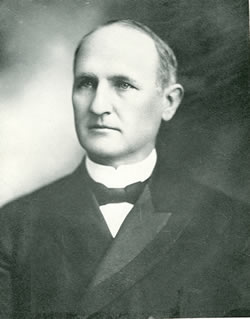The Politicians - Biographies
Allen, T. A., was state superintendent of education, 1923-1924, during which time the Rosenwald Fund offered monies for vocational education facilities.

Photographic Archives. North Carolina Collection, University of North Carolina at Chapel Hill.
Aycock, Gov. Charles Brantley (1859-1912) began his career as a schoolteacher. Aycock was interested, even before entering politics, in education and the betterment of public schools, though this was through the lenses of segregation. In the 1880s, for instance, he advocated for taxes in Goldsboro to support school development, with the plan that money from white taxpayers would go to white schools and money from blacks, to black schools.
In the late 1890s Republican governor Daniel L. Russell advocated for greater black participation in politics. Aycock, one of the main voices for North Carolina’s Democrats, cited the supremacy of whites as his reason for opposing Russell’s support for black participation.
Aycock’s emphasis on education continued through his 1900 gubernatorial campaign. The push for education for whites meant they could vote in greater numbers under literacy test laws, which he supported. Much of his tenure as governor was spent in promoting education across the state. While funding for black education increased at a slower rate than white, it saw some increase under his leadership, and rates of school attendance and length of school year in both communities increased. He was governor from 1901 to 1905.
As North Carolina’s “education governor,” Aycock’s influence was felt well into the era of the Jeanes teachers. The public underfunding of black schools in North Carolina during the Jim Crow era reflects the decisions made during Aycock’s governorship.
- from Dictionary of North Carolina Biography, vol. 1, pp. 73-75.
Brooks, Dr. Eugene Clyde (E. C.) (1871-1947) was a teacher and education advocate. In 1902, with Charles McIver, James Joyner, and others, he worked to advance Gov. Aycock’s education campaign, with its emphasis on improving white literacy to meet standards of political literacy tests. After the campaign, Joyner chose him for a role at the North Carolina Department of Public Instruction, where he focused on rural education development. In 1907 Brooks returned to his alma mater, Trinity College (later Duke University), to found a department of education and to improve North Carolina’s teacher training. He encouraged the development of teacher extension programs such as the Teachers’ Reading Circle. Between 1919 and 1923 he was state superintendent of public instruction and led many educational improvement efforts in the state for black and white students.
- from Dictionary of North Carolina Biography, vol. 1, pp. 236-237.
Joyner, James Yadkin (1862-1954), North Carolina’s state superintendent of public instruction from 1902 to 1919, supported Gov. Charles Aycock’s attempts to improve education in North Carolina. He served as a teacher in several schools across the state and in a number of education leadership roles before his appointment to the superintendency. Under Joyner’s leadership, schools improved in many ways including attendance rates, length of mandatory school year, and funding levels. He showed a willingness to explore alternative funding sources such as the Southern Education Board.
- from Dictionary of North Carolina Biography, vol. 3, pp. 336-338.







